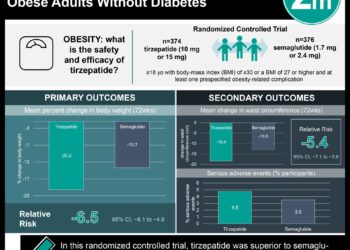Longer-duration breast feeding not associated with lower risk of obesity in childhood
[tabs tab1=”2MM Rundown” tab2= “2MM Full Report”]
[tab]
Image: PD
1. Limited evidence has suggested longer and exclusive breastfeeding in infancy may lower the risk of later childhood obesity while still promoting growth.
2. In fact, when examined in late childhood, children who received more exclusive and/or longer term breastfeeding had similar growth and body fat profiles.
Published today, the present study is the first large-scale randomized controlled trial to assess evidence from prior observational studies suggesting a link between exclusivity and length of breastfeeding during infancy and decreased risk of later obesity. In light of the growing childhood obesity epidemic in developed and developing countries worldwide, high-level evidence supporting a strategy to combat this issue would be of great value. Unfortunately, the authors were not able to substantiate the proposed role of infant breastfeeding in regulating later childhood weight and stature.
In terms of limitations, the study is limited by the strict geographic restriction to children born in Belarus, where cultural mores surrounding both breast feeding as well as pediatric health and nutrition are conceivably different than those of other developed nations. Indeed, as the authors acknowledge, the United States in particular has a much higher childhood obesity rate, though this is likely multifactorial. Moreover, the study design prevents the authors from obtaining data from the intervening years between birth and follow-up, during which time the effect of breastfeeding may have already materialized and been subsequently masked by other influences during later childhood. Yet while many questions remain unanswered, the findings of this study cast significant doubt on the influence of breastfeeding on childhood obesity and underscore the importance of further investigation into other causative factors.
Click to read the study in JAMA
[/tab]
[tab]
Image: PD
1. Limited evidence has suggested longer and exclusive breastfeeding in infancy may lower the risk of later childhood obesity while still promoting growth.
2. In fact, when examined in late childhood, children who received more exclusive and/or longer term breastfeeding had similar growth and body fat profiles.
This [cluster randomized controlled trial]: Participating mother-infant pairs were drawn from the Promotion of Breastfeeding Intervention Trial (PROBIT) cohort, consisting of infants born in Belarus between 1996 and 1997. As part of PROBIT, mother-infant pairs were randomized to receive either usual post-partum nutrition care or intervention with intensive breast-feeding support. Children were re-assessed between age eleven and fourteen, at which point various measures of obesity as well as circulating levels of insulin-like growth factor I (IGF-1, a growth-promoting hormone) were obtained. At early follow-up, children in the intervention group were significantly more likely to have been exclusively breast-fed and to still be breast-fed to some degree at one year of age. On later follow up (mean age 11.5 years), children from the two groups did not differ significantly with respect to any of the metrics of obesity (e.g. BMI, body fat percentage, waste circumference) nor in plasma levels of IGF-1.
Further reading:
3. Infant nutrition and later health: A review of current evidence
In sum: Published today, the present study is the first large-scale randomized controlled trial to assess evidence from prior observational studies suggesting a link between exclusivity and length of breastfeeding during infancy and decreased risk of later obesity. In light of the growing childhood obesity epidemic in developed and developing countries worldwide, high-level evidence supporting a strategy to combat this issue would be of great value. Unfortunately, the authors were not able to substantiate the proposed role of infant breastfeeding in regulating later childhood weight and stature.
In terms of limitations, the study is limited by the strict geographic restriction to children born in Belarus, where cultural mores surrounding both breast feeding as well as pediatric health and nutrition are conceivably different than those of other developed nations. Indeed, as the authors acknowledge, the United States in particular has a much higher childhood obesity rate, though this is likely multifactorial. Moreover, the study design prevents the authors from obtaining data from the intervening years between birth and follow-up, during which time the effect of breastfeeding may have already materialized and been subsequently masked by other influences during later childhood. Yet while many questions remain unanswered, the findings of this study cast significant doubt on the influence of breastfeeding on childhood obesity and underscore the importance of further investigation into other causative factors.
Click to read the study in JAMA
By Jeff Dewey and Rif Rahman
More from this author: Aneurysm diameter useful in determining frequency of surveillance, Maternal folic acid supplementation during early pregnancy associated with lower risk of autism, Energy drinks may be harmful to the health of adolescents, Early initiation of antiretroviral therapy linked with lower risk of cognitive impairment in HIV
© 2013 2minutemedicine.com. All rights reserved. No works may be reproduced without written consent from 2minutemedicine.com. Disclaimer: We present factual information directly from peer reviewed medical journals. No post should be construed as medical advice and is not intended as such by the authors or by 2minutemedicine.com. PLEASE SEE A HEALTHCARE PROVIDER IN YOUR AREA IF YOU SEEK MEDICAL ADVICE OF ANY SORT. Content is produced in accordance with fair use copyrights solely and strictly for the purpose of teaching, news and criticism. No benefit, monetary or otherwise, is realized by any participants or the owner of this domain.
[/tab]
[/tabs]





